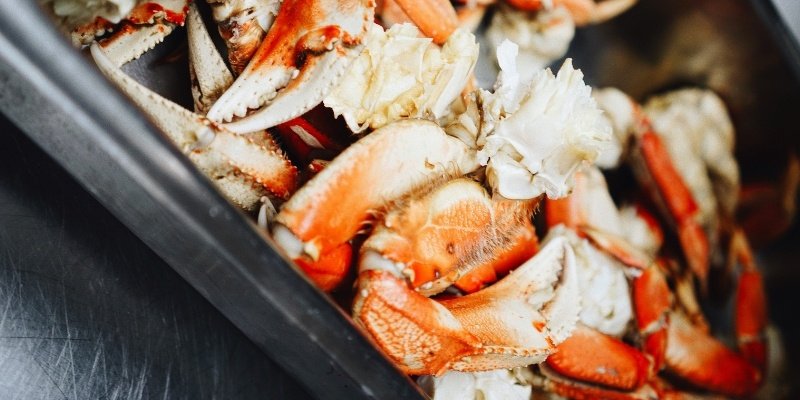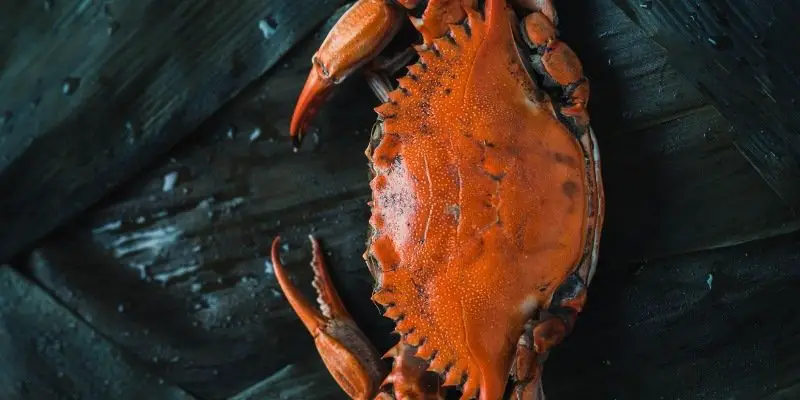Crab meat has numerous health benefits. Rich in phosphorus and, vital elements in bones and teeth. Crab is a wonderful food for cognitive ability and nervous system activity as it contains a variety of nutrients such as selenium, copper, vitamin B2, and omega-3 fatty acids. While many think all the fats must be dangerous for them, omega-3s are actually useful. They are balancing your cholesterol levels and enable antiinflammatory activity all through the body. And that’s just to give a few examples. Sounds like the crab could really have brought some benefits to your pet, right?
Can dogs have crab after all?
Yes, as long as you feed in moderation, dogs may eat cooked crab meat (but no butter, please). Crab is a good source of protein, ideal for energizing active dogs and helpful in building muscle after intense exercise. Protein is also instrumental in helping amino acids to grow healthy hair, nails, skin, and tissue. When it is fed to your dog, the crab must always be cooked. Uncooked crab meat has the potential to lead to the range of diarrheal diseases that can cause your dog to become ill for a long time. Cook it in the easiest possible way. It’s better to be boiled. But do not use seasoning.

Is crab good for dogs?
Crab is rich in vitamin B12, crucial for optimal bowel health and brain function in dogs, and also essential for pets with pancreatic insufficiency, a disorder that stops their pancreas from handling vitamin B12 in sources of food. Crab can be a tasty source of vitamin A that works wonders to improve the health of the dog’s eyes.


Is crab meat bad for dogs?
Naturally, crabs are high in cholesterol and sodium. Both of those are hard to digest when devoured in large quantities. This emphasizes the importance of offering crab meat to dogs in small portions to prevent any negative issues associated with cholesterol or sodium. Too much sodium can cause the development of hypernatremia, a condition that leads to high blood pressure, and poor blood circulation in dogs.

Crab and dogs With Iodine Allergies
Crab meat contains large quantities of iodine no matter how it has been prepared. Although it’s quite rare, some dogs are allergic to iodine. Sadly, you won’t ever know if your dog has an allergy to iodine until they eat something that contains iodine. If you feed crab for the very first time, you should begin with a tiny amount and keep a close watch on your dog after that.

Can dogs eat crab meat?
Symptoms of an allergy to iodine occur quite rapidly and begin with diarrhea and lack of energy. Some dogs get a runny nose and eyes, likely to result in some people thinking that their pup has the canine flu. If your dog eats crab and starts to show these different behavior patterns within five hours of intake, they are likely to have an allergic response. For specific advice, you should call and speak to your vet, but there’s not much you can do in addition to providing home care unless there is skin swelling or other severe conditions.

Can dogs eat crab legs?
As long as we are talking about unshelled meat from the crab legs your pup might eat it safely. As long as the portion is small and no salt or other spieces was added during the cooking process.

Can dogs eat imitation crab meat?
Generally, it’s safe to eat in small portions, on very rare occasions. However, we’d suggest you skip it, as it doesn’t have as many healthy nutrients as the real crab meat. And also comes with lots of chemical preservatives and artificial flavorings, that can be dangerous to your pup.
meat may look real, and your pup may still like the flavor, but it really doesn’t deliver the same vitamins and minerals as real crab meat. Reality is, crab meat imitation does not include any crab whatsoever.
Also recognized as seafood sticks, crab meat imitation is created using surimi. Surimi is a gooey substance made from either fish or meat, mostly from Alaska Pollock. It’s essentially water-drained minced fish. Surimi is widely used to make sushi, the next human meal that most dogs enjoy. Imitation crab meat is commonly found in crab cakes and California rolls.
There are quite a lot of surimi-based products sold in local grocery stores because those are cheaper. But overall Alaska Pollock is ok for dogs. Due to its high omega-3 fatty acids, this nutrient-dense fish is known to fight heart disease, and it’s also a fantastic protein source for dogs. It is a healthy treat for dogs with obesity-related issued because Pollock fish usually is lower in fat. You shouldn’t think twice about giving Pollock fish to your dog.
The big concern about offering crab sticks to dogs is the simple reality that surimi also includes lots of preservatives and other chemical ingredients. Dr. Josh Axe, a natural medicine doctor, said the dangerous chemicals used in crab meat imitation can cause unpleasant illnesses such as leaky gut and inflammations. There are tons of sugar and starch in some crab stick brands. To keep the crab meat in shape, manufacturers add these ingredients. Here are the classic fake crab meat ingredients:
- Alaska Pollock
- Water
- Crab Extracts
- Corn Starch
- Sodium pyrophosphate
- Refined fish oil
The ingredient from this list that caught our attention first is sodium pyrophosphate. To keep everything together, this commonly used food chemical is added. But if you didn’t know about it, it could be twice as harmful as table salt. That’s why eating food with plenty of sodium pyrophosphate leaves you with an unpleasant feeling in the stomach. If your dog is always constipated, giving him fake crab meat wouldn’t help, as it will only give the pup a harder time to defecate.
If your pet is often constipated, giving him fake crab meat wouldn’t help, as it will just give him a harder time to defecate. There is no carbohydrate or sugar in a three-ounce serving of real crab meat.
- There are as many as 13 grams of carbohydrates and 5 grams of sugar in the same amount of imitation crab meat.
- As far as the protein content is concerned, the amount is not even close to the actual crab meat’s protein content. Imitation crab meat contains only 6 grams of protein, and the authentic meat has 16 grams.
- Crab sticks ‘ potassium content is not even half of the real thing. Every three ounces of imitation crab has 77 mg potassium, much lower than 223 mg potassium in genuine crab meat.

Can dogs eat crab shells?
No, absolutely not. If you decide to give crab meat to your dog, you must always make sure the shell is gone. Don’t ever let your dog swallow the shell because it can lodge between the teeth or jammed in their throats, potentially leading to very dangerous consequences, that may require surgery.

My dog ate a crab shell. What should I do?
If you know your dog was eating crab shells, but don’t see anything to worry about, the shells probably went through normally. However, you should keep an eye on your dog, as the warning signs may not appear immediately. When a dog ingested crab shells, legs, or claws, there are only two things to expect: they were either broken down or made their way to the gastrointestinal (GI) tract.
When shells are compacted, they are likely to create a blockage. You can easily say that when your dog’s belly is bloated, there is a blockage. The only solution is to bring him to an emergency veterinarian. Your vet will conduct an endoscopic recovery to remove the crab shell from the upper digestive tract (mouth, belly, and esophagus) of your dog.
This is done with a small camera inserted into the mouth all the way into the belly. If the blockage is no longer present in his upper digestive tract, the dog’s intestine may already be obstructed. If there is no blockage, the sharp edges of the shells could tear the GI of your dog. If there is no blockage, the edges of the shells could start ripping the GI of your dog.
Since crab shells are more likely to have sharp edges you can’t induce vomiting. Doing so will just cause more harm and is likely to cause laceration of the throat. If surgery is not feasible, the last ditch effort is to give Vaseline dog sandwiches. is usually dog-safe in reasonable amounts and appears to work as a natural laxative.

Dogs and crab meat. Summary
Crabmeat is mostly considered a safe dog food. Just remember that it has to be unshelled, low in salt and fed in moderation. It has a high content of healthy fats, protein and Vitamin B12, which can be a great help to meet pup’s daily dietary needs. Be on the lookout for symptoms of allergy, though, because some dogs can’t handle consuming any amount of crab meat.
Credits: thanks for the cover photo to Mae Mu from Unsplash. Photo used in the text: Marie-France Latour on Unsplash.


